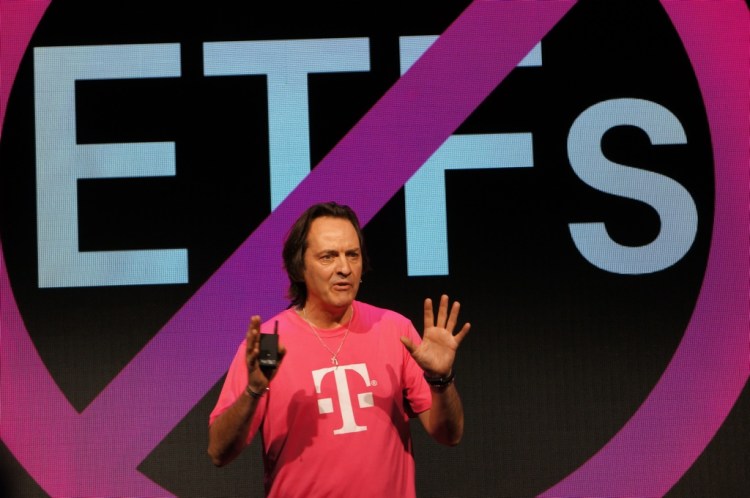Many rumors are afoot about Sprint expanding its markets by acquiring T-Mobile.
Would this be beneficial to both Sprint and T-Mobile, as well as to the overall wireless marketplace? In a word – yes.
AT&T and Verizon have run away with the market in the US over the past few years as Sprint has fallen further behind in subscriber base and core networks. T-Mobile has been aggressively pricing its services and has gained some market share as a result (mostly by taking subscribers from Sprint), but lags far behind both AT&T and Verizon in subscriber base.
We’ll be exploring the changing wireless landscape at MobileBeat 2014, and what it mans for mobile businesses.
Join us in San Francisco on July 8-9!
In fact, Sprint and T-Mobile combined would still have a smaller subscriber base than the big two players — although they’d at least finally approach the scale of those telecom giants.
The US wireless market is becoming saturated and growing at a smaller rate than in the past few years. As a result, AT&T is looking to acquire international carriers to increase their size and scale (which makes it easier to negotiate with suppliers) and boost revenues when the local market may not offer the necessary growth. Verizon will likely eye acquisitions as well and for the same reasons.
This leaves Sprint with a declining market share, an aging network technology footprint, and consistent subscriber loss due to the aggressive nature of the competition. T-Mobile’s network is better, but still sub-par coverage-wise.
Sprint and T-Mobile work on two different base technologies. Does that present a problem in merging? It would not be an easy combination for legacy devices and subscribers.
But LTE is the great equalizer in the sense that it no longer matters about CDMA (Sprint) vs. GSM (T-Mobile). No doubt it will be years before all the existing subscribers on either network fully transition to LTE, so a combined company would have to maintain two network footprints for at least 3-4 years (Sprint did this once before when it acquired the iDen network). That keeps the costs of operations higher than they would like, but it’s doable. The companies can also incentivize users to upgrade to new devices sooner allowing a quicker refresh.
The biggest problem carriers face is the shortage of spectrum required to continually improve coverage and increase speeds. Between them, Sprint and T-Mobile would own a good deal of spectrum making it an attractive combination. Further, with this relatively under loaded spectrum comes the ability to offer new and competitive services that excess capacity enables. This could be a competitive advantage against AT&T and Verizon, particularly if the combined company adopted the aggressive pricing and “in your face” marketing of T-Mobile.
A merger won’t be an easy proposition. Other than the difficulty in putting together a financial package, obtaining regulatory approval is the biggest challenge. But given Sprint’s subscriber losses, and T-Mobile and Sprint individually being substantially below the 110M+ or so subscribers at AT&T and VZW, you could make an argument that they must combine to survive and/or thrive in the marketplace. And I think the numbers support that conclusion.
Consumers would do better with a viable third carrier bringing some competitive aggressiveness to the market, than with two weak third and fourth place contenders.
Since Sprint is primarily owned by a foreign investor (Softbank), would that be a regulatory hurdle? I don’t think the regulators would balk over Japanese ownership (VZW was substantially foreign owned by Vodafone for many years). It would likely be different if it were Chinese ownership, but Japan as a close ally would not have the same political ramifications, in my opinion.
I believe it would be in the best interest of both Sprint and T-Mobile to combine assets, creating a viable third competitor in the US where the minor players are shrinking.
T-Mobile is “buying” more subscribers through hefty payments/rebates, but can’t continue to do that forever and make a profit. The argument about lowering competition with fewer choices is only valid when the competition is on equal footing and has the potential to make a difference in cost structure and/or products. At this point, with Sprint so far behind, you can’t make that argument. Even T-Mobile has limited marketing capability against the duopoly of Verizon and AT&T.
Bring on a viable third competitor and we might all benefit..
 Jack Gold is the founder and principal analyst at J.Gold Associates, based in Northborough, Mass. He covers the many aspects of business and consumer computing and emerging technologies.
Jack Gold is the founder and principal analyst at J.Gold Associates, based in Northborough, Mass. He covers the many aspects of business and consumer computing and emerging technologies.


